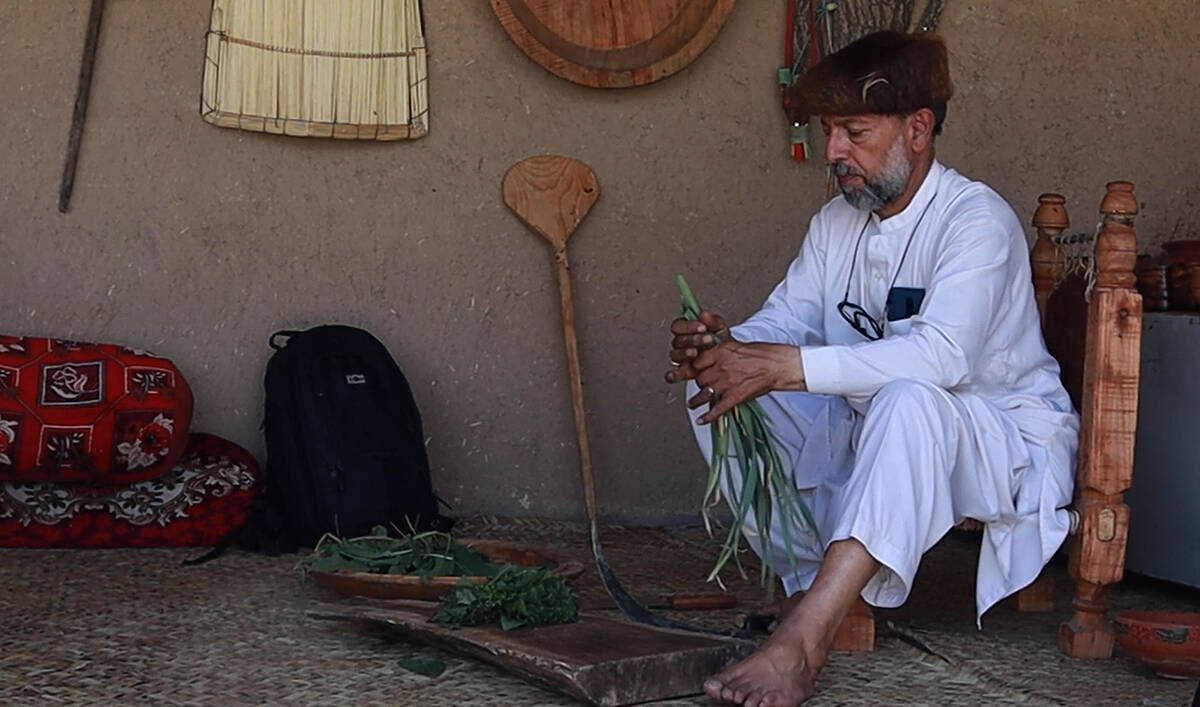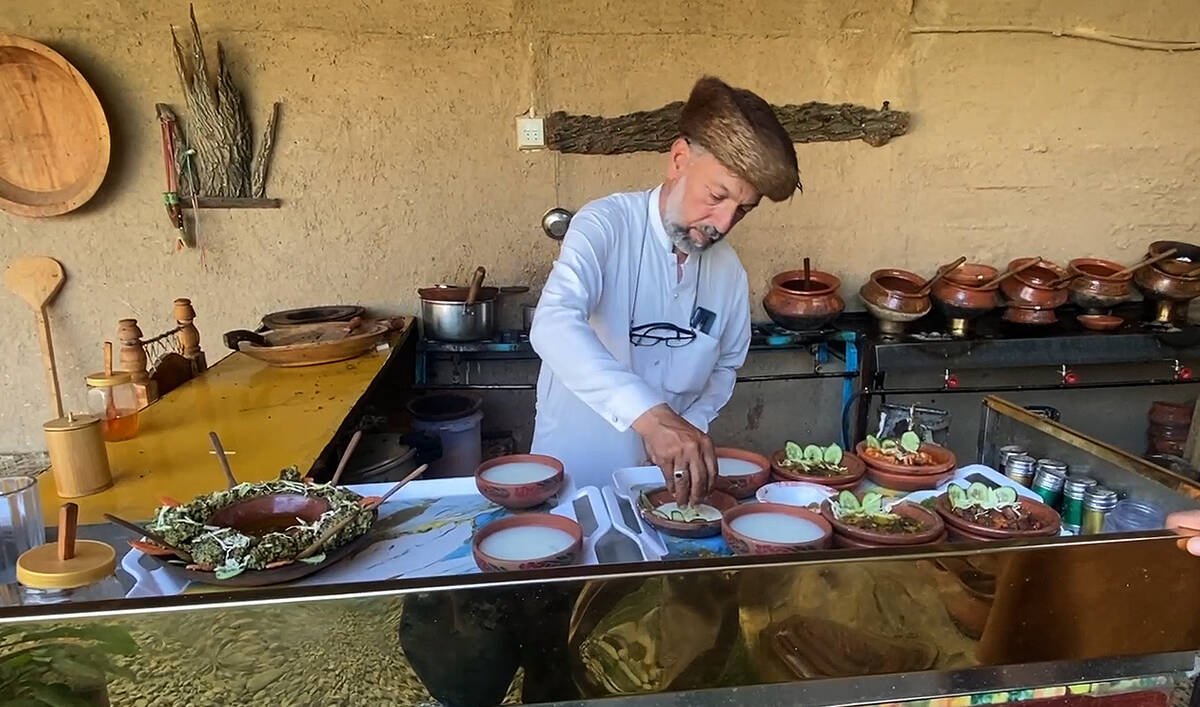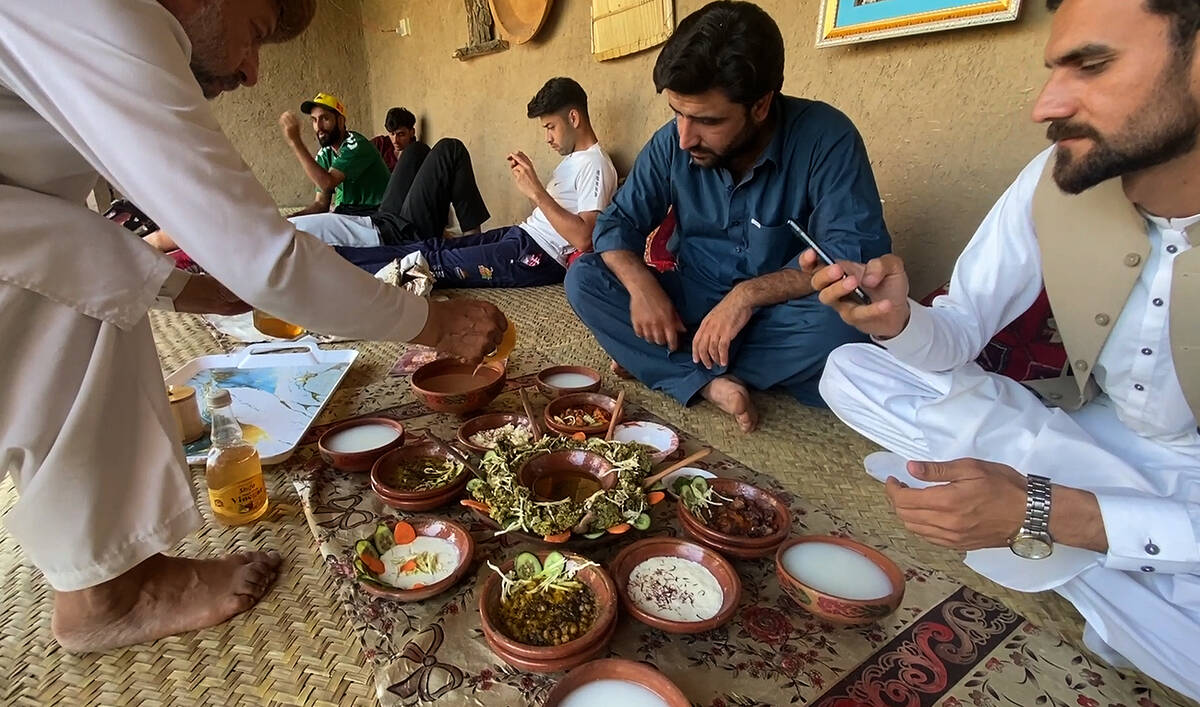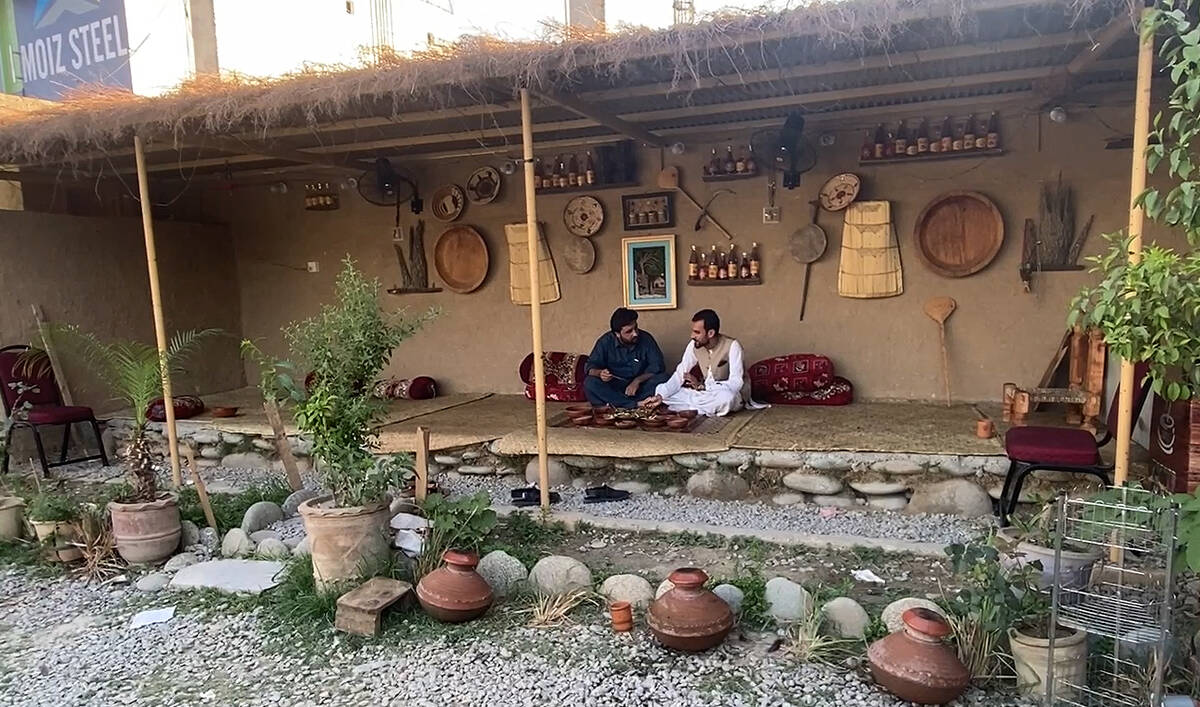HASANABAD, Pakistan: Planting cotton for the first time was shaping up as a shrewd investment for young Pakistani farmer Muhammad Awais — until the floods struck.
“I used good, expensive seed, fertilizers and pesticides ... The first picking made me enormously happy,” said Awais, 26.
“But the floods meant the reaping was my last,” he told the Thomson Reuters Foundation as he walked among the shreds of his ruined crops on a small plot in Hasanabad, a village in the central cotton-growing district of Dera Ghazi Khan.
Devastating floods linked to climate change killed 1,700 people and submerged huge swathes of land in Pakistan during July and August, wrecking a third of its cotton crop and the livelihoods of millions of farmers, pickers and other workers.
Locally grown cotton is sold to the textile industry that accounts for 60 percent of Pakistan’s total export earnings, and the shortage of supplies has closed scores of mills, with hundreds of thousands of jobs feared at risk, industry sources said.
“A lot of mills are running at partial capacity or shutting down due to non-availability and shortage of quality raw material and tough economic conditions,” said Kamran Arshad, a senior official with the All Pakistan Textile Manufacturers Association.
“With zero state support or social security, I’m afraid, 20 percent to 25 percent of the labor force will lose jobs,” he said by phone from the eastern city of Lahore.
In the textiles hub of Multan, union representative Musawwir Husain Qureshi said about 200 mills had closed. Arshad gave a similar figure for the number of shutdowns and partial operations.
“Our mill has continued despite the odds,” said Qureshi, echoing the industry association’s calls for urgent government aid for the sector, which is also struggling with surging energy costs amid a wider economic malaise.
The government announced discounted electricity rates for millers earlier this month, but officials have played down the risk of mass factory closures and cotton shortages — noting a series of poor harvests in recent years.
“For the last four or five years, they have been meeting the shortfall through imports,” said Muhammad Ali Talpur, an economic consultant at the federal government.
“They will be importing as much as they have already been doing. So no need for layoffs,” he added.
SHATTERED DREAMS
In Pakistan’s cotton farming areas, growers are already counting their losses, which are also affecting a myriad of different workers in the sector.
Truck drivers have nothing to transport and many ginners — who are involved in the process of removing the seeds and debris from raw cotton — are sitting idle.
Like Awais, farmer Omar Daraz had hoped for a healthy yield and profit this year, especially since the price fixed by the government — 10,000 Pakistani rupees ($46) for 40 kg (88 pounds) of cotton — was promising.
“We were dreaming of earning well this time. But the rains and floods shattered all those dreams,” Daraz, 30, said as he surveyed scattered stems of cotton plants across his land, the craters left by the floods still visible.
Before the flooding, Pakistan’s cotton crop was forecast to reach 10.5 million bales, up from 8.3 million last year, and despite the losses, there is time for output to recover, said Cotton Commissioner Khalid Abdullah.
“The cotton crop not fully damaged can compensate. All buds open to flowers during September will translate into fibers,” he said.
Still, the amount of cotton received by members of Pakistan’s ginners’ association (PCGA) is down 24 percent from last year, according to a report published earlier this month.
Cotton picker Khanum Mai used to work at Daraz’s farm, but she and fellow day laborers said the crop losses meant they would miss out on months of earnings.
In the nearby town of Natkani, Commission agent Zahoor Ahmad, who helps farmers grade, weigh, pack and sell their harvests to buyers, told a similar story.
“I used to deal in 6,000-8,000 kg of raw cotton per day. Now I deal in 200-300 kg a day,” said Ahmad as he weighed a bag of cotton brought in by a farmer.
CLIMATE-PROOF CROPS?
Growers called on the government to help them recover by providing solar-powered tube-wells for irrigation, tractors with soft loans, and free seeds and fertilizers.
“You rehabilitate our farms and in six months we will be on our own,” Daraz said.
Abdullah, the cotton commissioner, said the government planned to give producers one bag of wheat seed and one bag of fertilizer to sow wheat for summer harvest.
Daraz, however, said he and other local farmers would not be able to plant due to the damage left by the floods.
As extreme weather fueled by climate change batters farmers across South Asia, Abdullah said Pakistan’s government had started research on cotton “varieties that are climate resilient, and with varying degrees of adaptability.”
Major cotton-producing countries such as Brazil and China offer an example of how technology can be harnessed, said Mushtaq Ahmad Gill, a Lahore-based agriculture expert.
“Brazil has achieved the highest productivity average in the world ... by investing in technology and training of growers, and innovating in research and growing techniques,” he said.
Such methods could include laser-guided land levelling to flatten croplands to an even plane, which helps reduce operational costs and boost yields, and conservation agriculture that safeguards natural resources, biodiversity and labor.
His farming hopes dashed, Awais is now focusing on the master’s degree in mathematics he was pursuing.
But first, he said he planned to have his cotton spun and made into a quilt out of his first and only batch to remind him of this year’s disaster.
“This memory will live on with me,” he said. ($1 = 216.7500 Pakistani rupees)
Pakistan floods leave cotton workers’ dreams in tatters
https://arab.news/6ywcn
Pakistan floods leave cotton workers’ dreams in tatters

- Floods have wrecked a third of Pakistan's cotton crop and livelihoods of millions of farmers and other workers
- Locally grown cotton is sold to the textile industry that accounts for 60% of Pakistan's total export earnings
Temperatures in Pakistan may hit 50°C this week, a global record — report

- Wednesday and Thursday might be the hottest April days for Pakistan, says report
- Says Pakistan recorded temperatures over 4 degrees above average so far this month
ISLAMABAD: Temperatures in central and southern Pakistan may surge to 50°C this week, nearing the global record for the highest temperature ever recorded in April, as per a report by American newspaper The Washington Post.
The warning comes amid increasingly unpredictable climate patterns across South Asia, with several cities in Pakistan’s southern Sindh province such as Karachi experiencing more frequent and intense heatwaves in recent years— a trend that climate experts attribute to broader shifts caused by global warming.
The situation underscores rising concerns over Pakistan’s preparedness for extreme weather events amid growing calls for stronger climate adaptation policies, increased tree cover in urban areas and more effective public awareness campaigns.
“Temperatures in central and southern Pakistan rose to 118 degrees Fahrenheit (47.8°C) last weekend and are forecast to climb through Wednesday, possibly nearing the global April record of 122 degrees Fahrenheit (50°C),” The Washington Post said in a report.
“Heat will build across the Middle East and South Asia through the week, with Wednesday and Thursday looking like the hottest days for Pakistan.”
It added that Sindh’s Nawabshah city had reached the 50°C mark back in April 2018 and could repeat the same this week. Nawabshah recorded a temperature of 50.2°C back then and set a new global record for the highest temperature ever observed in April.
The report said “a sprawling dome of high pressure like a heavy lid trapping heat in a pot” was causing the current heat wave, stretching from the Middle East to South Asia. It noted that this area experiences the Earth’s most unusually warm temperatures during April.
It quoted the European Center for Medium-Range Weather Forecasts as predicting the maximum temperature to remain around 50°C in central Pakistan on Wednesday and Thursday.
“Temperatures have been more than 4 degrees above average in Pakistan so far this April, even before the arrival of this week’s potentially record-breaking heat,” it added.
Pakistan ranks among the top ten countries most vulnerable to climate change, grappling with increasingly frequent extreme weather events from deadly heatwaves to devastating floods.
The 2015 heatwave claimed over 2,000 lives in Karachi alone while the 2022 floods left more than 1,700 dead and over 33 million displaced nationwide.
‘Strive for peace’: Saudi Arabia seeks de-escalation of Pakistan-India tensions

- Riyadh urges neighbors to resolve disagreements through diplomatic channels, strive for stability and peace for their people and region
- Tensions have surged following attack on tourists in Indian-administered Kashmir that New Delhi blames on Pakistan, which denies the charge
ISLAMABAD: Saudi Arabia has expressed concern over heightened tensions between nuclear-armed neighbors Pakistan and India amid exchanges of fire along their disputed border separating Kashmir and fears of an Indian military incursion, state news agency SPA reported on Wednesday.
Relations have plummeted following a deadly attack on tourists in Indian-administered Kashmir on Apr. 22 that New Delhi has said Pakistan was involved in. Islamabad denies the charges. Fears have risen since that India may conduct limited airstrikes or special forces raids near its border with Pakistan.
Pakistan’s information minister said on Tuesday night the country had “credible intelligence” India intended to carry out military action against it in the “next 24-36 hours on the pretext of baseless and concocted allegations of involvement in the Pahalgam incident.”
“The Kingdom appealed to both nations to de-escalate, avoid further escalation, resolve their disagreements through diplomatic channels, uphold the principles of good neighborliness, and strive for stability and peace for the welfare of their people and region,” SPA said.
Meanwhile United Nations Secretary-General Antonio Guterres spoke separately on Tuesday with Pakistan’s Prime Minister Shebaz Sharif and India’s Foreign Minister Subrahmanyam Jaishankar.
“The Secretary-General also expressed his deep concern at rising tensions between India and Pakistan and underscored the need to avoid a confrontation that could result in tragic consequences. He offered his Good Offices to support de-escalation efforts,” UN spokesperson Stephane Dujarric said.
The US State Department has also said Washington was in touch with both India and Pakistan while urging them to work toward what it called a “responsible solution.”
In public, the US government has expressed support for India after the attack but has not criticized Pakistan.
Since the attack, in addition to soldiers shooting over the Line of Control frontier that divides disputed Kashmir between the two nations, India and Pakistan have announced tit-for-tat diplomatic measures that included cancelation of visas and a recall of diplomats.
New Delhi also suspended a crucial water-sharing treaty with Islamabad and ordered its border shut with Pakistan. In response, Pakistan has closed its airspace to Indian airlines.
Kashmir is disputed between India and Pakistan since 1947, with both ruling it in part but claiming it in full.
Pilgrims begin arriving in Madinah as Pakistan launches Hajj flights operation

- Over 89,000 pilgrims will travel under the government’s scheme, traveling to Makkah and Madinah via 342 flights
- Pilgrims from Karachi and Islamabad are availing Makkah Route Initiative designed to streamline immigration process
ISLAMABAD: Pakistani pilgrims who will perform the annual Hajj pilgrimage this year under the government scheme began arriving in Madinah this week as Pakistan kicked off its 33-day-long Hajj flight operation.
Over 89,000 pilgrims will travel under the government’s scheme, departing for Makkah and Madinah via 342 flights, with the last one departing from Pakistan on May 31. The first Hajj flights departed from Islamabad, Lahore, Karachi and Quetta for the Saudi city of Madinah on Tuesday.
“First flight carrying 393 pilgrims from Islamabad landed at Prince Mohammad bin Abdulaziz International Airport,” Radio Pakistan reported on Wednesday.
“The intending pilgrims were transported to their residences in special buses. Later, they were warmly received at their hotels and presented flowers, chocolates, dates and refreshments as per Saudi cultural traditions.”
The pilgrims from Karachi and Islamabad availed the Makkah Route Initiative, which is designed to streamline immigration processes by enabling pilgrims to complete official travel formalities at their departure airports. Initially tested in Islamabad in 2019, the program was later expanded to Karachi, benefitting tens of thousands of Pakistani travelers. This saves pilgrims several hours upon arrival in the Kingdom, as they can simply enter the country without having to go through immigration again.
Around 50,500 Pakistani pilgrims will travel to Saudi Arabia under the initiative this year. The scheme was launched in 2019 by the Saudi Ministry of Hajj and Umrah and has been implemented in five countries: Pakistan, Malaysia, Indonesia, Morocco and Bangladesh.
Besides those using the government scheme, 23,620 Pakistanis will also perform Hajj through private tour operators.
The total quota for pilgrims granted to Pakistan for 2025 was 179,210, which could not be filled.
Traditional Swati rice dish finds new life at Pakistani valley’s roadside eatery

- Restaurant owner Nasar Khan began preparing warjale as a hobby, turned it into a business after strong demand
- Labor-intensive dish prepared with begumi rice grown in Swat and mixed with naturally occurring bitter wild greens
SWAT: At a small mudbrick, hut-style restaurant in Pakistan’s picturesque Swat Valley, customers are showing up to try a traditional delicacy: warjale.
A local version of vegetable rice served with clarified butter, yogurt, cheese, milk, fresh cream and sometimes with the sauce of chicken meat, warjale, an old regional dish, is being kept alive as the main attraction at the Kawdareen Traditional Restaurant (KTR) in Mingora city.
Known for its scenic landscape of mountains and trees and cultural heritage and archaeological sites, Swat attracts thousands of visitors every year.
Many now seek out Khan’s modest eatery to experience a taste of the valley’s traditional cuisine, especially warjale, which is made from a special rice called begumi, named after a noblewoman, Begum Bilqees Effandi, who had brought the rice variety’s seeds from Afghanistan in 1949 and cultivated it in the Bagh Dherai area of Swat for the first time.

“I had another business, this was my hobby but God gave me a chance and made this a business out of my hobby,” Nasar Khan, the 60-year-old owner, told Arab News at the restaurant which he started six years ago to revive traditional foods from the valley and introduce them to young people.
“I had in mind that our traditional food should be commercialized so that the youth who don’t know about it should get a sense of it, that was the main aim.”
Khan said he served nearly all the traditional foods of Swat, such as warjale, khare, a popular dish made with lamb, tomatoes, garlic and minimal spices cooked in a traditional karahi pan, as well as saag, which is cooked mustard or similar bitter wild greens.

A warjale meal was typically served with desi ghee, fresh cream and a yogurt-based drink called lassi. A portion for two people costs around Rs1,000, less than $1, while a three-person meal costs around Rs1,300.
Cooking warjale was a labor-intensive task, Khan explained.
“Warjale is cooked in a specific kind of saag, which can’t be cultivated but grows naturally,” he said. “The locals then pluck it and cut it in a special way … People of upper Swat call it chukan and those who live in the lower part call it warjale.”

Khan said warjale’s distinct flavor derived from ingredients that could only be sourced in Swat’s environment.
“The soil of Swat is fit for growing [Begami rice], which needs cold weather, fresh water and an environment like this,” he said.
Tourists visiting the restaurant vouched for the unique taste.
Izhar Zeb Yousafzai, a computer science lecturer visiting from Timergara, said he first heard about KTR online:
“We saw some videos about this restaurant on social media. We had a day off today, so we came here with friends ... Warjale was their specialty and we got a chance to eat it after a long time. When we gave it a try, we found its taste delicious.”

Asad Khan, a 28-year-old resident from Besham in Shangla district, said he had come to Swat for sightseeing before he heard about the restaurant and the dish.
“Warjale is the traditional food of Swat,” he said. “The way it is cooked and then presented with desi ghee, it has an exceptional taste, we can’t explain it.”
Pakistan says army destroyed Indian posts along Kashmir border after ‘unprovoked’ firing

- Indian forces used small arms to attack Pakistani posts in Kayani and Mandal sectors on Tuesday night, state media reports
- Pakistan information minister says Islamabad has “credible intelligence” New Delhi intends to launch military action within 36 hours
ISLAMABAD: Pakistan army troops responded to “unprovoked” Indian shelling on Tuesday night across the de facto border that divides the disputed Kashmir region between the two nations, state media reported on Wednesday citing security sources, adding that Indian posts were destroyed in the exchange.
Tensions have surged between the nuclear-armed neighbors following a deadly attack on tourists in Indian-administered Kashmir on Apr. 22 that New Delhi has said Pakistan was involved in. Islamabad denies the charges and has said it will participate in any credible and transparent investigation of the assault.
Fears have risen since that India may retaliate by conducting limited airstrikes or special forces raids near the Line of Control (LoC), which runs 742km (460 miles) dividing the parts of Kashmir governed by India and Pakistan and acts as part of the de facto border between the two countries.

State-run Pakistan Television (PTV) reported India had carried out “unprovoked” firing in the Kayani and Mandal sectors of the Line of Control on Tuesday night. Small arms were used by the Indian forces, prompting Pakistan to respond.
“There are also reports that multiple enemy posts were destroyed by the Pakistan Army’s effective response,” PTV said, naming one of them as the Chakpathra post.
PTV said India had earlier evacuated areas near its side of the disputed Kashmir border and launched a “crackdown” against Muslims in the area. These reports have not been independently verified.
“This provocation from India reflects its war hysteria,” PTV said. “The Pakistan Army is fully prepared to defend the country’s sovereignty at all times.”
Earlier on Wednesday, the state-run Associated Press of Pakistan reported that a “timely” response by the Pakistan Air Force (PAF) had “forced” four Indian Rafale jets to retreat after payrolling near the two nations’ de facto border.
“On the night of April 29/30, four Indian Rafale jets conducted patrolling within Indian geographical boundaries” near the LoC, APP reported, saying PAF “immediately” detected the jets.
“A timely and swift response by the Pakistan Air Force forced four Indian Rafale jets to retreat … The Pakistani armed forces remain fully prepared and alert to give a befitting response to any aggression from India.”
Since last Tuesday’s attack, in addition to shooting over the Line of Control frontier, India and Pakistan have announced tit-for-tat diplomatic measures that included the cancelation of visas and a recall of diplomats. New Delhi also suspended a crucial water-sharing treaty with Islamabad and ordered its border shut with Pakistan. In response, Pakistan has closed its airspace to Indian airlines.
Late on Tuesday night, Pakistan’s Information Minister Ataullah Tarar said Pakistan had “credible intelligence” India was planning military action against it in the “next 24-36 hours on the pretext of baseless and concocted allegations of involvement in the Pahalgam incident.”
The statement came after Indian Prime Minister Narendra Modi on Tuesday reportedly authorized his country’s armed forces to respond to the latest attack in whatever way it deemed fit.
India and Pakistan both claim Kashmir in full and rule it in part since 1947.












